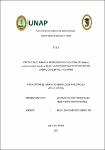Protocolos para la reproducción inducida de Myleus schomburgkii (Jardine, 1841), usando extracto pituitario de carpa, conceptal y ovaprim
Abstract
The objective of the present study was to determine the effect of three hormonal inducers (EPC, Conceptal®, and Ovaprim®) on spawning induction and spermiation in the reproduction of black-winged palmetto Myleus schomburgkii, (0.70 ± 0.10 kg of weight and 27.81 ± 1.25 cm in length in males and 0.72 ± 0.29 kg in weight and 28.84 ± 3.56 cm in length in females). The reproducers were captured from the natural environment (Downstream community Santa Clara River Nanay) and transported to the facilities of the "Fernando Alcántara Bocanegra" Research Center of the IIAP, Iquitos. The protocols were applied in a 12-hour interval, which were performed in two doses (the first 10% of the total calculated and the second 90% of the total dose calculated): T1 (EPC): 6 mg / kg in females and 2 mg / kg in males; T2 (Conceptal) 2.5 ml / kg in females and 1.5 ml / kg in males and; T3: (Ovaprim) 0.50 ml / kg in females and 0.25 ml / kg in males. A positive effect on ovulation was found in 66.6% in T1 and 11.1% in T2, results corroborated with the analysis of variance, determining significant differences (P 0.05). Likewise, significant differences were also reported in the analysis of oocyte diameter in different months of evaluation. Spawning occurred at 27 hrs (using EPC) after the final induction dose of 4.52 g and 208.80 (mean egg count / 1 g of spawning) and fecundity of 942.03 were applied. Fertilized eggs had positive results.using fish tanks with zero flow at 40 hours. El objetivo fue determinar el efecto de tres inductores hormonales (Extracto Pituitario de Carpa, Conceptal® y Ovaprim®)) en inducción al desove y la espermiación en la reproducción de Myleus schomburgkii, ( 0 . 7 0 ± 0.10 kg de peso y 27.81 ± 1.25 cm de longitud en machos y 0.72 ± 0.29 kg de peso y 28.84 ± 3.56 cm de longitud en hembras). Los peces fueron capturados del medio natural (Aguas abajo de la comunidad de Santa Clara en la cuenca del Río Nanay) y llevados al Centro de Investigaciones “Fernando Alcántara Bocanegra” del IIAP, Iquitos. Se aplicaron protocolos en un intervalo de 12 hrs. al inicio luego paso a 15 hrs, en dos dosis (10 % del total calculado y 90 % de la dosis total calculado respectivamente): T1 (EPC): 6 mg/kg en hembras y 2 mg/kg en machos; T2 (Conceptal) 2.5 ml/kg en hembras y 1.5 ml/kg en machos y; T3: (Ovaprim) 0.50 ml/kg en hembras y 0.25 ml/kg en machos. Encontrándose efecto positivo sobre la ovulación en un 66.6 % en el T1 y 11.1 % en el T2, resultados corroborados con el análisis de varianza, determinándose diferencias significativas (P<0.05) entre los tratamientos. En machos inducidos se obtuvo una leve respuesta positiva con la hormona EPC (T1), siendo un 22.2 % de eficiencia hormonal. Asimismo, se reportó diferencias significativas en el análisis del diámetro ovocitario. El desove ocurrió a las 27 hrs (con EPC) después de aplicada la dosis final de inducción obteniendo 4.52 g equivalente a 208.80 promedio de óvulos /g de desove y fecundidad de 942.03, siendo la fecundación positiva.
Collections
- Tesis [12]


